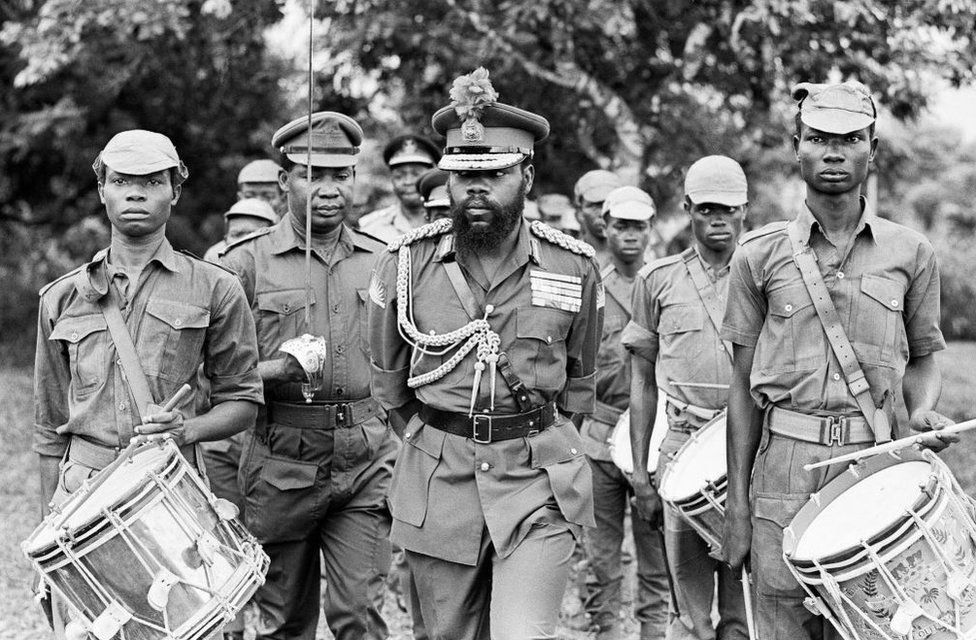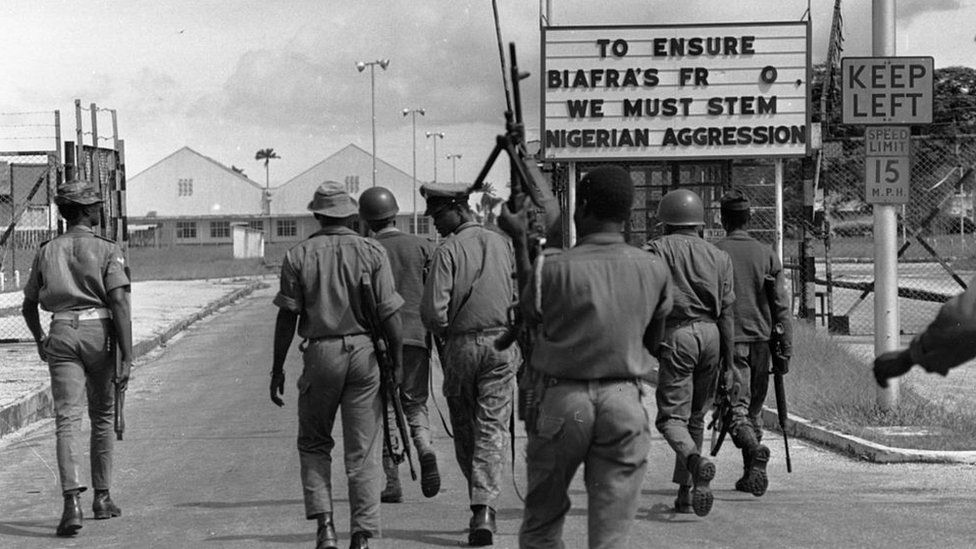Remembering Nigeria's Biafra war that many prefer to forget
- Get link
- X
- Other Apps

The deaths of more than a million people in Nigeria as a result of the brutal civil war which ended exactly 50 years ago are a scar on the nation's history.
For most Nigerians, the war over the
Painful but we do not regret the runfortunate episode best forgotten, but for the Igbo people who fought for secession, it remains a life-defining event.
In 1967, following two coups and turmoil which led to about a million Igbos returning to the south-east of Nigeria, the Republic of Biafra seceded with 33-year-old military officer Emeka Odumegwu Ojukwu at the helm.
The Nigerian government declared war and after 30 months of fighting, Biafra surrendered. On 15 January 1970, the conflict officially ended.
The government's policy of "no victor, no vanquished" may have led to a lack of official reflection, but many Nigerians of Igbo origin grew up on stories from people who lived through the war.
Three of those who were involved in the secessionist campaign have been sharing their memories.
'We thought we were magicians'
Christopher Ejike Ago, soldier
He had just finished grammar school and started training as a veterinary assistant at the University of Nigeria, Nsukka (UNN), in south-eastern Nigeria, when the civil war began.
Almost every student he knew became part of the war effort.
He joined the Biafran army and was assigned to the signal unit, whose responsibilities included "active intelligence and eavesdropping on the Nigerian military".
The Nigerians who were pursuing us were trained soldiers... We were drafted into the war, given two days' training."

"We thought we were magicians," said 76-year-old Mr Ago.
"The Nigerians who were pursuing us were trained soldiers. We were not. We were drafted into the war, given two days' training.
"Plus the fact that we were hungry. Some of us, our skin was getting rotten. Nobody can fight a war like that."
In January 1966, some senior Nigerian army officers, mostly of the Igbo ethnic group, assassinated key politicians during a coup in the West African state.
Those killed included Ahmadu Bello, a revered leader in the north.
This led to months of massacres against the Igbo living in the north. Tens of thousands were killed while about a million fled to what was then known as the Eastern Region.
 IMAGE SOURCE,MIRRORPIX
IMAGE SOURCE,MIRRORPIX
These events sparked the decision to secede, spearheaded by Ojukwu, who was then the military governor of the Eastern Region.
In the months preceding the war, Ojukwu often visited UNN, the only university in south-eastern Nigeria at the time, to meet with students and prepare them for secession.
Mr Ago looked forward to these visits, and joined the crowd who gathered at the university's Freedom Square.
"Once his helicopter touched down, everybody went there and, practically, school shut down.
"He had this incredible sense of humour. He spiked everybody up and we formed songs and were singing and enjoying ourselves."
In the first year of the war, the Nigerian government captured the coastal city of Port Harcourt and imposed a blockade, which cut food supplies to Biafra.
 IMAGE SOURCE,EVENING STANDARD
IMAGE SOURCE,EVENING STANDARDMr Ago remembers the overpowering hunger that often forced Biafran soldiers to catch and eat mice. He also remembers the last year of the war when his unit was continuously on the move, fleeing the advancing Nigerian army.
"Somewhere in the middle of the war," he said, "the Biafrans made some dramatic successes that gave us hope that we might hold the Nigerians until at least some help from outside came."
By late 1969, all hope was lost.
- Get link
- X
- Other Apps





.jpeg)
Comments
Post a Comment